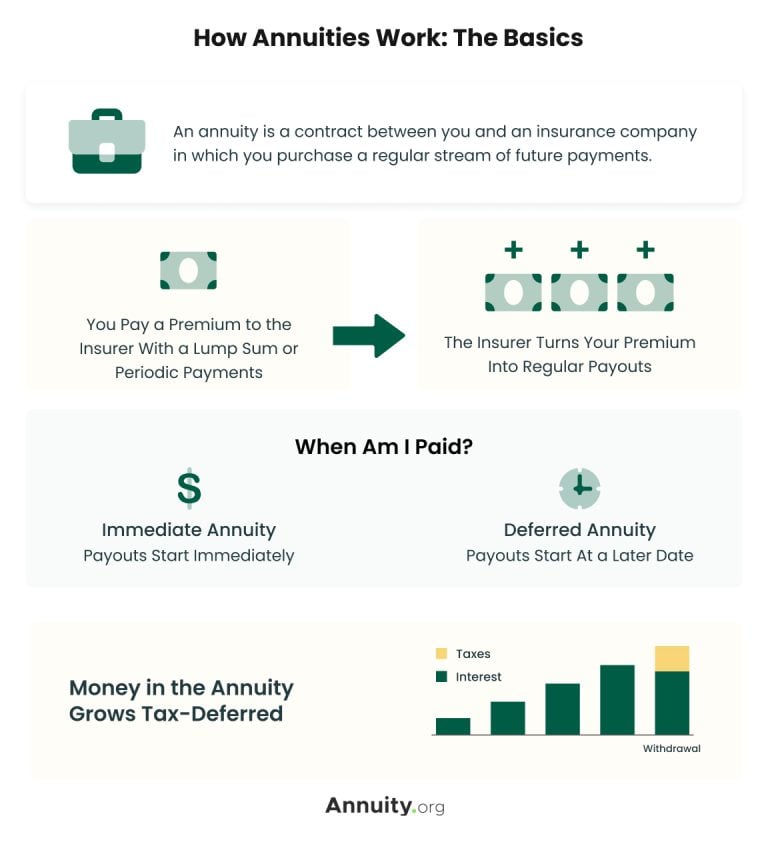
Annuities are powerful financial instruments designed to provide guaranteed income for life. Whether you’re planning for retirement, seeking long-term financial security or diversifying your investment portfolio, annuities offer a customizable solution tailored to you. Discover how annuities can help secure your financial future.

Jennifer Schell, CAS® Financial Writer, Certified Annuity Specialist® Jennifer Schell is a professional writer focused on demystifying annuities and other financial topics including banking, financial advising and insurance. She is proud to be a member of the National Association for Fixed Annuities (NAFA) as well as the National Association of Insurance and Financial Advisors (NAIFA). Read More
John Stevenson, CFF Owner and Advisor at Stevenson Retirement Solutions John Stevenson, a Certified Financial Fiduciary®️, specializes in securing retirements with tax-free accounts. With a focus on guaranteed retirement, he's ensured none of his clients suffer from market fluctuations. As a renowned educator and podcast host, John empowers thousands weekly, sharing his expertise in minimizing taxes and protecting against financial downturns. Read More
Lamia Chowdhury Financial Editor Lamia Chowdhury is a financial editor at Annuity.org. Lamia carries an extensive skillset in the content marketing field, and her work as a copywriter spans industries as diverse as finance, health care, travel and restaurants. Read More
Aamir M. Chalisa, MBA, LUTCF, MDRT General Manager at Futurity First Insurance Group Aamir M. Chalisa is the GM at Futurity First, leading Oak Brook's top branch. With 30+ years' expertise, chairs GAMA Global, driving diversity worldwide. Read More
Fact Checked Fact CheckedAnnuity.org partners with outside experts to ensure we are providing accurate financial content.
These reviewers are industry leaders and professional writers who regularly contribute to reputable publications such as the Wall Street Journal and The New York Times.
Our expert reviewers review our articles and recommend changes to ensure we are upholding our high standards for accuracy and professionalism.
Our expert reviewers hold advanced degrees and certifications and have years of experience with personal finances, retirement planning and investments.
How to Cite Annuity.org's ArticleAPA Annuity.org (2024, August 22). Annuities. Retrieved September 16, 2024, from https://www.annuity.org/annuities/
MLA "Annuities." Annuity.org, 22 Aug 2024, https://www.annuity.org/annuities/.
Chicago Annuity.org. "Annuities." Last modified August 22, 2024. https://www.annuity.org/annuities/.
Why Trust Annuity.org Why You Can Trust Annuity.orgAnnuity.org has provided reliable, accurate financial information to consumers since 2013. We adhere to ethical journalism practices, including presenting honest, unbiased information that follows Associated Press style guidelines and reporting facts from reliable, attributed sources. Our objective is to deliver the most comprehensive explanation of annuities and financial literacy topics using plain, straightforward language.
We pride ourselves on partnering with professionals like those from Senior Market Sales (SMS) — a market leader with over 30 years of experience in the insurance industry — who offer personalized retirement solutions for consumers across the country. Our relationships with partners including SMS and Insuractive, the company’s consumer-facing branch, allow us to facilitate the sale of annuities and other retirement-oriented financial products to consumers who are looking to purchase safe and reliable solutions to fill gaps in their retirement income. We are compensated when we produce legitimate inquiries, and that compensation helps make Annuity.org an even stronger resource for our audience. We may also, at times, sell lead data to partners in our network in order to best connect consumers to the information they request. Readers are in no way obligated to use our partners’ services to access the free resources on Annuity.org.
Annuity.org carefully selects partners who share a common goal of educating consumers and helping them select the most appropriate product for their unique financial and lifestyle goals. Our network of advisors will never recommend products that are not right for the consumer, nor will Annuity.org. Additionally, Annuity.org operates independently of its partners and has complete editorial control over the information we publish.
Our vision is to provide users with the highest quality information possible about their financial options and empower them to make informed decisions based on their unique needs.
An annuity Annuity An insurance product that earns interest and generates periodic payments over a specified period of time, typically with the purpose of providing income in retirement. is a customizable contract issued by an insurance company that converts an investor’s premiums into a guaranteed, fixed-income stream.
More specifically, an annuity contract is a legally binding, written agreement between you and the annuity provider that issues the contract. This contract transfers your longevity risk Longevity Risk Longevity risk is the risk that you will outlive your retirement savings. — the risk of you outliving your savings — to the insurance company. In exchange, you pay premiums Premium A regular payment made to keep insurance coverage active. as outlined in the contract.
Many retirees need more than Social Security Social Security Social Security is a federal benefits program for retirees in the United States, funded by taxes. and investment savings to provide for their daily needs. Annuities provide a way to potentially accumulate wealth, defer taxes, preserve their principal and ensure a reliable income stream in retirement.

Guarantee Income for Life With an Annuity
Keep your retirement plans on track.Different types of annuities exist to fit the diverse needs of the market. Your personal goals and objectives will determine the type of annuity that is right for you.
Annuities can be structured for immediate or deferred payout. When considering an annuity, you must first define your financial goals and when you want to start receiving annuity payments.
If you want to begin receiving annuity payments within a year or less, you will choose an immediate annuity.
Alternatively, if you’d rather set your payments to begin at some point in the future, you will purchase a deferred annuity and specify the start date in your contract. Most deferred annuities can be categorized into three main types: fixed, indexed and variable annuities.
RELIABLE GROWTH
Fixed Annuities
GROWTH POTENTIAL
Indexed Annuities
FLEXIBLE INCOME
Variable Annuities
INCOME NOW
Immediate Annuities
At their most basic, annuities work by converting a premium into a stream of payments. The amount and duration of the payments depend on various factors, including the type of annuity, the premium amount, the annuitant’s age and the chosen payout option.
Most annuities supply income through a process of accumulation and annuitization. The exception is immediate annuities that begin paying out as soon as within a month of purchase with no accumulation phase Accumulation Period An accumulation period is the period of time when annuity premiums increase in value. necessary.
When you buy a deferred annuity, you pay a premium to the insurance company. That initial investment grows throughout the accumulation phase, typically anywhere from five to 30 years based on the terms of your contract. An annuity’s growth is tax-deferred; unlike other safe accumulation products like certificates of deposit (CDs), you won’t owe taxes on the growth of your annuity while it’s in the accumulation phase.
Once the annuitization, or distribution, phase begins — again, based on the terms of your contract — you may start receiving regular payments. At this point, any income you receive from your annuity is considered taxable income.
Brandon Renfro, Ph.D., CFP®, RICP®, EA Co-Owner of Belonging Wealth ManagementAnnuities can be a great tool to help you generate retirement income or reach other financial goals, but there are many kinds of annuities. It’s important that you understand how they work to know if one is right for you.
As a Certified Financial Planner™ professional and Retired Income Certified Professional®, Brandon Renfro is well-versed in the financial information and strategies needed to meet retirement goals. In addition to co-owning Belonging Wealth Management and assisting clients, Brandon writes regularly for financial publications.
Annuity contracts transfer all the risk of a down market to the insurance company. This means you, the annuity owner, are protected from market risk and longevity risk. To offset this risk, insurance companies charge fees for investment management, contract riders, and other administrative services. In addition, most annuity contracts include surrender periods during which the contract holder cannot withdraw money from the annuity without incurring a surrender charge.

Many people choose annuities to create a lifetime income stream, but annuities pay out in a couple of different ways. When a deferred annuity reaches the end of the surrender period, the owner has a choice; they can leave the annuity to continue accumulating value, withdraw the entire value of the annuity in a lump sum, or annuitize the contract.
Annuitization refers to the process of converting a contract into income payments. Annuity owners can choose from several options for how long they continue to receive those payments. The length of the payout period will affect how much income goes into each payment; the longer the expected payout, the smaller the payment amounts will be.
Annuitized Payout Options
The amount of income you’ll receive from an annuity payment depends not only on how long the annuity pays out but also how much value the contract accumulated before annuitization. For fixed, indexed or immediate annuities, this is referred to as the annuity rate.
Annuity rates influence payout because the higher an annuity’s rate is, the more value it will accumulate. The more valuable the annuity is when it is annuitized, the bigger the payments will be.
Fixed and immediate annuities accumulate interest according to a set rate that’s guaranteed when the contract is purchased. Indexed annuities earn interest based on a minimum fixed rate and additional interest that’s credited based on the performance of an equity market index like the S&P 500.
Certain contract provisions, like guarantees and riders, can also influence annuity payouts. Riders are additional features that annuity customers use to customize their contract, usually for a fee.
Some riders offer guarantees for how long an annuity will pay out or how much the payout will be. These types of riders are especially popular as add-ons for variable annuities, which normally have an unpredictable payout. A majority of variable annuities are sold with living benefit riders, which lock in certain guarantees for annuity payouts while the annuitant is alive.

Lock In Today’s Very Best Fixed Annuity Rates
Explore annuity products and rates.An annuity could be good for someone who is looking for a conservative savings vehicle that can establish a lifetime income stream in retirement. For this reason, annuities are generally considered appropriate for older people who are close to retirement and have already contributed to other tax-advantaged retirement savings vehicles like a 401(k) or IRA.
Key Considerations When Buying an Annuity
Financial Goals and Needs How will this annuity fit into your overall financial plan? Do you want to generate retirement income, plan for long-term care expenses, or leave a legacy to your heirs? Understanding your goals will help you select the most suitable type of annuity.
Tax Implications Annuities grow on a tax-deferred basis, but the income you receive from the annuity will be taxable. Understand all the tax implications of purchasing an annuity, including how withdrawals and distributions are taxed.
Beneficiary Designation What will happen to the annuity when you die? Do you want to pass on the annuity to your spouse, child or other beneficiary? Consider how your annuity fits into your estate plan.
Provider Selection Research and select a reputable annuity provider. Look for providers with strong financial stability, a good track record and positive customer reviews.
Aamir M. Chalisa, MBA, LUTCF, MDRT General Manager at Futurity First Insurance GroupAnnuities are designed to fit the safe money investments, specially fixed and index annuities. I
have many clients that, even at older ages, have all their money in the market and even though
returns may be greater at times, they risk even losing their principle. I always advise them to
make annuities a part of your retirement planning process as at least your principal is protected,
and you still have a growth possibility. The good thing is that so many different types of
annuities are available in the market that one can create a basket of products to invest in. A
client recently who lost in market investments made up money from positive gains in his annuity.
Aamir M. Chalisa is the GM at Futurity First, leading Oak Brook’s top branch. With 30+ years’ expertise, chairs GAMA Global, driving diversity worldwide.